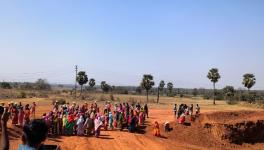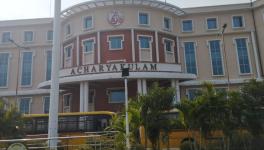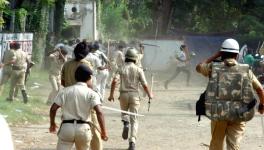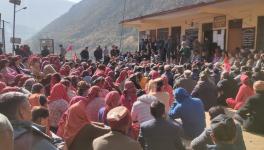Bastar: Villagers Grapple with Unemployment, Poverty Two Decades After Giving Land to Steel Plant
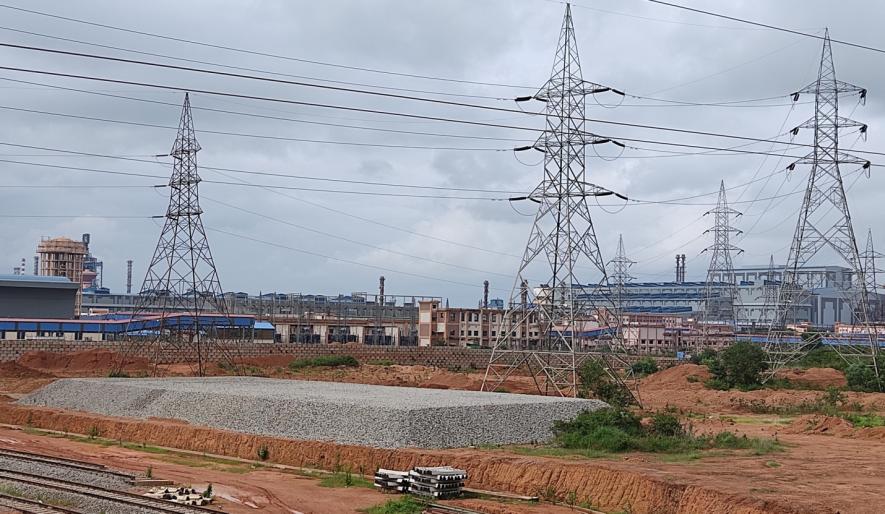
Nagarnaar Steel Plant / Bastar
Sagar, a 13-year-old boy, was seen desperately waiting for his mother to return from the farm fields in the neighbouring village in Bastar, Chattisgarh. During the COVID-19's second wave, Sagar lost his father, Laikan, who used to work in Nagarnaar steel plant as contractual labour. Laikan is survived by his son, wife and elderly parents.
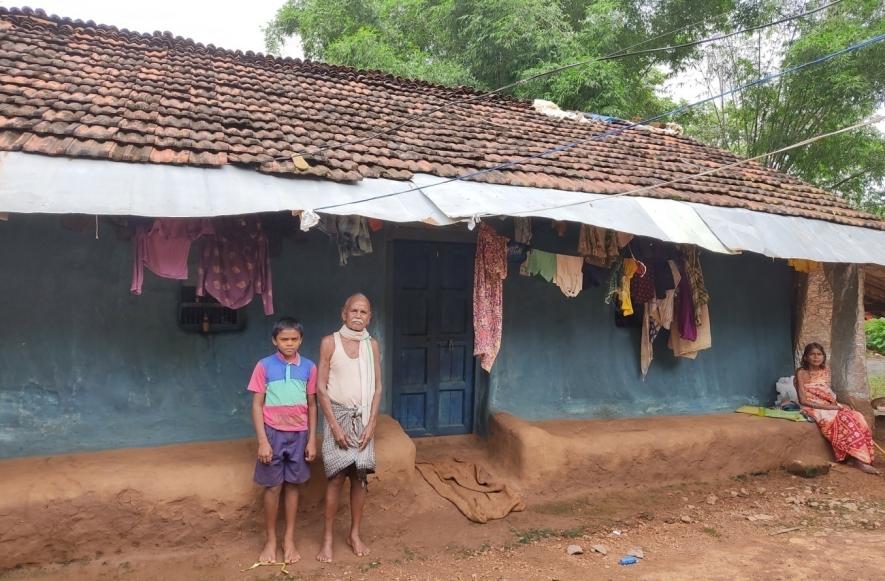
Sagar with grandparents outside his mud house
Laikan, once an owner of eight acres of land, was left landless after he gave his land to the steel plant authorities with an expectation to get benefit either in the form of a job or money. But neither happened and instead, he was recruited as contract labour due to less qualification and did not qualify to receive benefits like social security. Even after his death, not a penny made its way to his house in the form of compensation.
Deceased Laikan's wife Sunita, now the sole bread earner of the family, works in farm fields as an agricultural labourer. Living on the margins, the family of four regrets giving their land to the steel plant and feels betrayed by government officials.
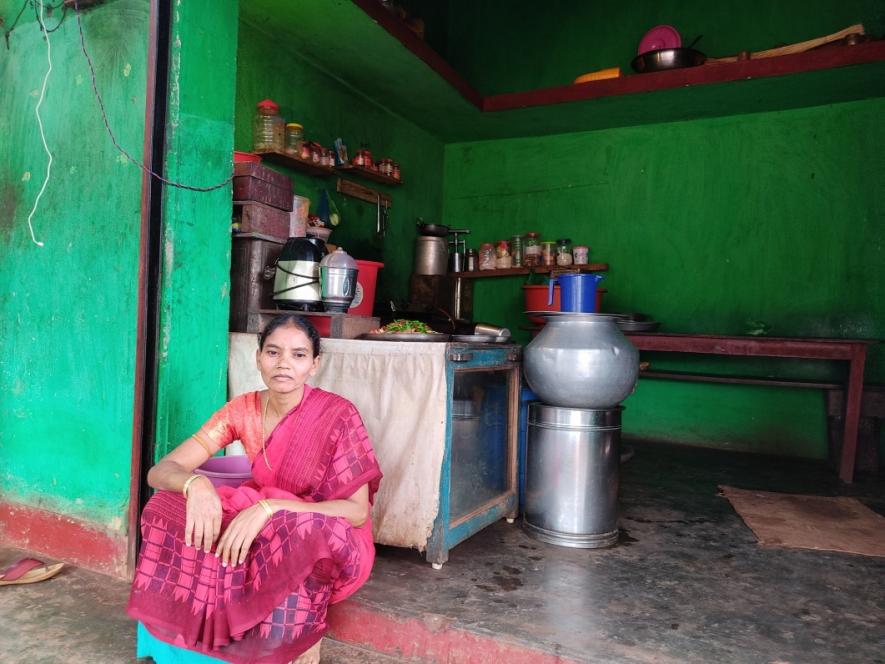
Radha Mani at her tea shop
The family of Radha Mani, who runs a tea shop just a kilometre from the steel factory, was also left in the lurch by factory authorities after giving their land. The death of her husband compelled her to earn a livelihood. Her two daughters and a son all collectively work at the shop to help their mother.
Radha's family gave up their two-acre plot for the government-run factory in 2010, which would have benefitted her husband with a job. But authorities, after acquiring the land, shunned their requests, and the promised benefits did not come their way.
Radha told NewsClick, "My husband had to wait for joining work for five years. Our plea was not heard. In 2015, he joined as a non-regular worker at the steel plant due to having no educational background, and four years later, he expired. The authorities evaded our pleadings for benefits citing my husband's illiteracy as a reason. Witnessing the financial crisis, I had to take a room on rent to sell tea."
Instances of land acquisition started way back in 2001 when National Mining Development Corporation (NMDC) (the premier mining authority and Central PSU) conceived the Nagarnaar Steel Plant and made inroads in rural hamlets of Bastar. The integrated steel plant with the capacity of three million tonnes per annum came up on 1,980 acres of land at the cost of Rs 23,140 crore with 2,000 people in the workforce.
As many as 303 families in the early 2000s were identified as land donors for the factory establishment, but handing over employment was still a distant dream. In 2005, after waiting for four years, villagers staged a vigilant vocal protest against the factory authority for not providing them with jobs. The protest lasted for 52 days and ended up attaining employment for 100 people i.e. one person per family at the Nagarnaar steel plant.
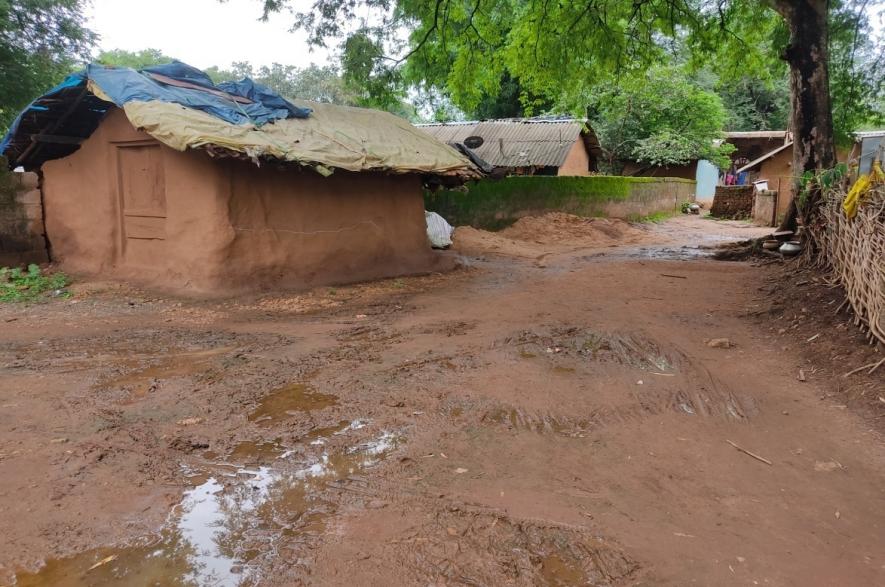
Muddy road in a village / Nagarnaar
The villagers expected that giving land to a government would fetch them prolonged social security and development for the village, but these never became a reality. The rural settlement within a kilometre of the steel plant has not witnessed even a stint of development in the last two decades. Muddy paths turn into water-logged pits every monsoon with no basic infrastructure like lamp-posts or community hall for tribals. "This is a betrayal in the name of benefits," said Jitendranath, leader of the Steel Shramik Union at the Naganaar Steel Plant.
Giving an acre of land for the steel plant could not ensure job security to Yogita Balaprakash as well. Along with two siblings, she gave land to NMDC in 2010, which paved the path for the employment of her brothers, but she was excluded from the beneficiary list. According to Yogita, outsiders extract local resources and erect factories on their lands while leaving them empty-handed. Without land and a job, survival has become difficult. She fed her mother by teaching at a private school that closed down during the COVID-19 pandemic, making them repent the decision to relinquish their land to NMDC.
According to the union leader, the second round of land acquisition in 2010 got a cold response with less favourable outcomes. Complaints of job denial to around 98 women who gave land to the plant also surfaced. The clear accusation of job denial on gender lines is exerting pressure on the plant's decision makers.
An NMDC official, on condition of anonymity, revealed that a hearing on complaints of 98 applicants was underway. After the matter reached the district administration, the NMDC management backtracked on the issue and decided to come up with a solution. On the accusations of no compensation or benefits given to deceased non-regular employees during COVID-19, he said higher officials were responsible for answering, and he was unaware of the complainants.
Besides the exclusionary moves of job and benefit denial by NMDC, the recent outrage among tribals is against the privatisation of the steel plant. Protests broke out last year when the Narendra Modi-led government at the Centre decided on the demerger and strategic sale of the Naganaar Steel plant.
The Gram Sabha gave assent to the plant due to the public sector's involvement, which is still well documented in the government record. The issue of privatising the plant would be met with protests and agitation, said a gram sabha member.
"A plant was being set up here for the first time since Independence, so the people of Bastar reposed faith in its establishment. But now, as privatisation is being carried out, this trust will be lost. The Nagarnaar plant cannot be allowed to be handed over to the private sector. This will lead to further exploitation of the tribals," said Jitendranath.
Incidentally, the state government seems to have stood in support of tribals against the demerger and privatisation of the plant.
In a letter dated August 26, 2020, Chhattisgarh Chief Minister Bhupesh Baghel wrote to Prime Minister Narendra Modi, saying that the move would hurt the tribal community's expectations at a time when the state has been successful in curbing Maoist activities.
Get the latest reports & analysis with people's perspective on Protests, movements & deep analytical videos, discussions of the current affairs in your Telegram app. Subscribe to NewsClick's Telegram channel & get Real-Time updates on stories, as they get published on our website.










